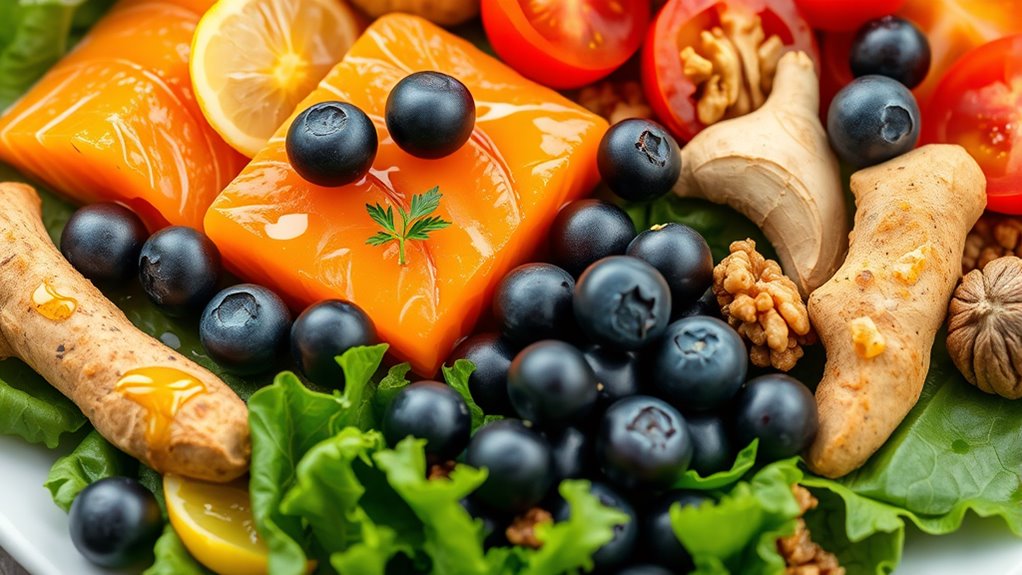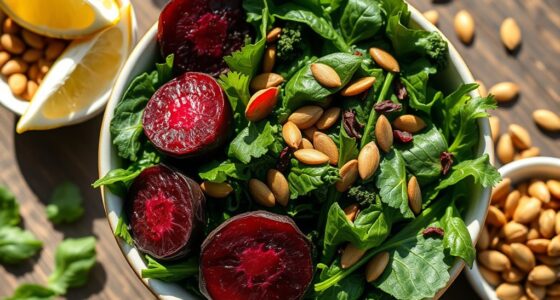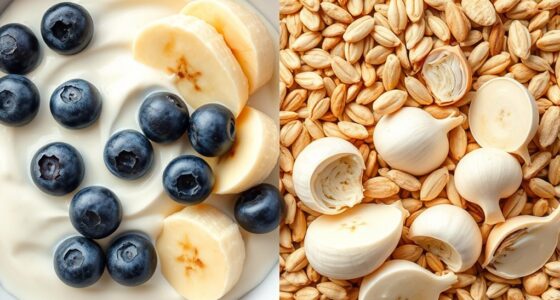To follow an anti-inflammatory diet, focus on eating plenty of colorful fruits and vegetables, healthy fats like olive oil and omega-3 rich fish, and lean proteins. Avoid processed foods, added sugars, trans fats, and excessive red meats. Incorporate spices like turmeric and ginger, and stay hydrated. Adopting these habits can help reduce chronic inflammation and boost your overall wellness—discover more tips to support your health journey next.
Key Takeaways
- Focus on whole, minimally processed foods like fruits, vegetables, nuts, seeds, and lean proteins to reduce inflammation.
- Incorporate healthy fats such as olive oil, avocados, and omega-3-rich fatty fish for their anti-inflammatory benefits.
- Limit processed foods, added sugars, refined carbs, trans fats, and excess salt that can trigger inflammation.
- Use anti-inflammatory spices like turmeric and ginger to naturally support immune health.
- Maintain hydration, portion control, and stress management to enhance overall inflammation reduction efforts.
Key Principles of an Anti-Inflammatory Diet

To effectively follow an anti-inflammatory diet, you need to understand its key principles. First, focus on incorporating whole, minimally processed foods, avoiding added sugars, refined carbs, and unhealthy fats. Emphasize fruits, vegetables, nuts, seeds, and lean proteins, which help reduce inflammation. Balance your meals with healthy fats like olive oil and omega-3 fatty acids, known for their anti-inflammatory properties. Limit intake of processed foods, trans fats, and excess salt, which can trigger inflammation. Pay attention to portion sizes and aim for consistency in your eating habits. Staying hydrated and reducing alcohol consumption also support inflammation management. Incorporating personality insights can help tailor your dietary choices to better suit your individual needs and preferences. By sticking to these core principles, you’ll set a solid foundation for an effective anti-inflammatory diet.
Foods to Embrace for Reducing Inflammation

Incorporating anti-inflammatory foods into your diet can substantially help reduce inflammation and improve overall health. Focus on adding plenty of colorful fruits and vegetables like berries, leafy greens, and bell peppers, which are rich in antioxidants and phytochemicals. Include healthy fats such as olive oil, avocados, and nuts, known for their anti-inflammatory properties. Fatty fish like salmon, mackerel, and sardines provide omega-3 fatty acids that fight inflammation. Whole grains like oats and brown rice support your immune system and reduce inflammation. Spices like turmeric and ginger are also powerful natural anti-inflammatories you can incorporate into meals. By emphasizing these foods, you’ll nourish your body and create a foundation for long-term health and vigor.
Ingredients to Minimize or Avoid

Avoiding certain ingredients is essential for maintaining an anti-inflammatory diet. You should cut back on processed foods high in added sugars, as they trigger inflammation and insulin spikes. Limit intake of refined carbohydrates like white bread and pastries, which can cause similar effects. Trans fats found in many fried and packaged foods promote inflammation and should be avoided entirely. Excessive consumption of red and processed meats, such as bacon and sausages, also increases inflammation levels. Additionally, watch out for artificial additives, preservatives, and flavorings that may irritate your immune system. Alcohol, especially in excess, can promote inflammation and impair your body’s ability to heal. Incorporating lifestyle factors such as balanced diet and stress management can further support your anti-inflammatory goals. By minimizing these ingredients, you’ll help reduce inflammation and support your overall health.
The Role of Antioxidants and Phytochemicals
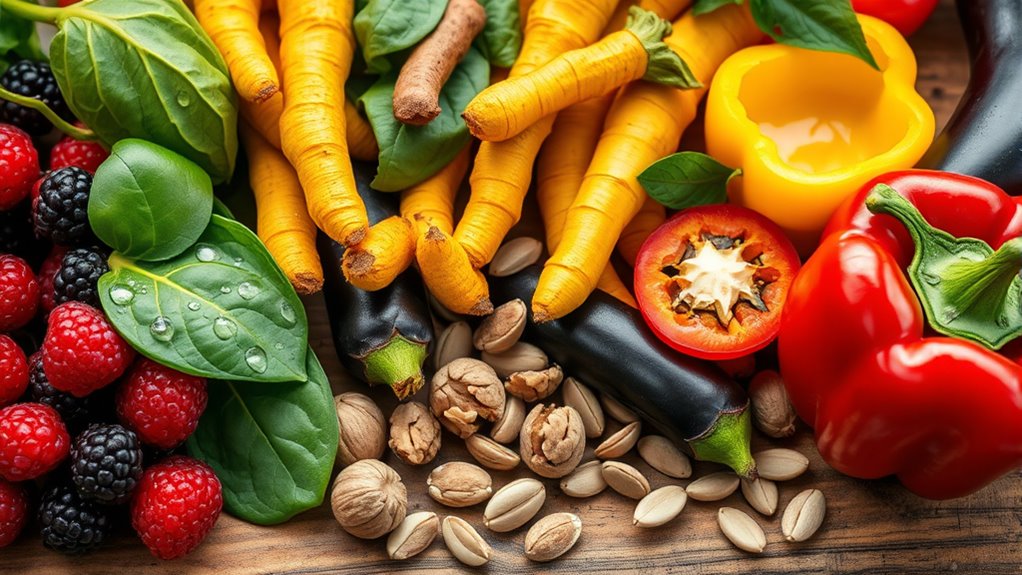
Antioxidants and phytochemicals play a crucial role in fighting inflammation by neutralizing free radicals that can damage cells and tissues. When your body produces free radicals, they can cause oxidative stress, which promotes inflammation and contributes to chronic disease. Consuming foods rich in antioxidants—like berries, leafy greens, nuts, and colorful vegetables—helps protect your cells from this damage. Phytochemicals, naturally occurring compounds in plants, also have anti-inflammatory properties. They work by modulating pathways involved in inflammation and supporting your immune system. Incorporating a variety of colorful fruits, vegetables, herbs, and spices ensures you get a broad spectrum of these powerful compounds. Understanding antioxidant mechanisms can further enhance your dietary choices for inflammation reduction. By doing so, you naturally bolster your body’s defenses against inflammation and promote overall health.
Practical Tips for Incorporating Anti-Inflammatory Foods
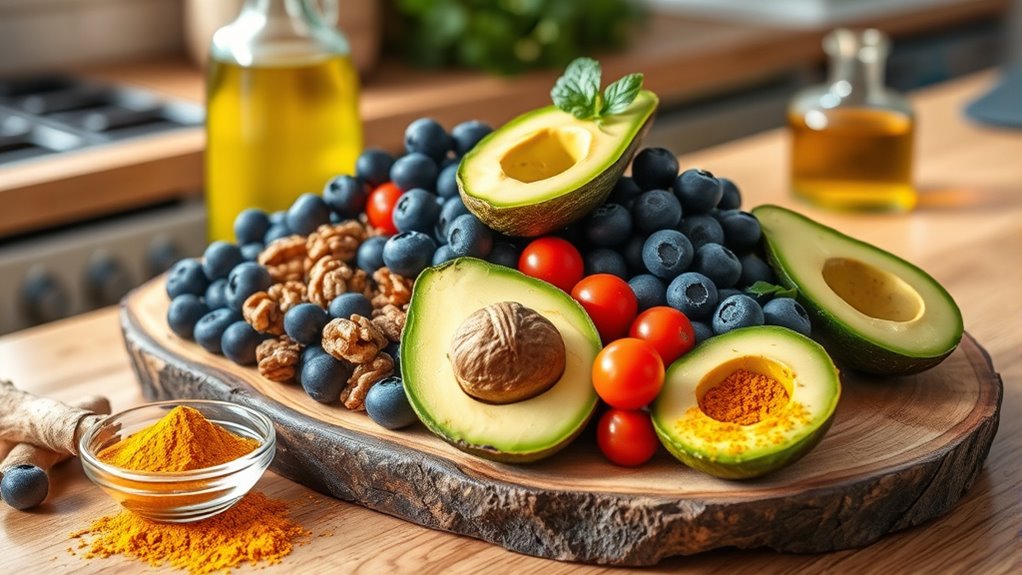
To start incorporating anti-inflammatory foods, fill your plate with colorful vegetables like spinach, bell peppers, and carrots. Use healthy fats such as olive oil or avocados to boost your meals’ benefits. Also, cut back on processed foods that can trigger inflammation and focus on whole, nutrient-dense options. Incorporating wooden accents and vintage decor elements can also create a calming, rustic atmosphere that promotes overall well-being.
Incorporate Colorful Vegetables
Have you considered how adding a splash of color to your plate can boost your anti-inflammatory efforts? Bright vegetables like bell peppers, carrots, spinach, and tomatoes aren’t just visually appealing—they’re packed with antioxidants and phytochemicals that fight inflammation. Incorporate these into your meals by roasting a medley of colorful veggies, tossing them into salads, or blending them into smoothies. Aim to fill half your plate with a variety of shades, ensuring you’re getting a broad spectrum of nutrients. Experiment with different textures and flavors to keep it interesting. Keep your goal in mind: a diverse array of vibrant vegetables helps reduce inflammation and supports overall health. Including antioxidants in your diet is an effective way to combat oxidative stress and promote wellness. Make it a habit to include colorful vegetables in your daily meals for a more effective anti-inflammatory diet.
Use Healthy Fats
Incorporating healthy fats into your diet is a simple yet powerful way to reduce inflammation. These fats support your body’s immune response and improve overall health. Swap out saturated fats for sources like avocados, nuts, and olive oil. Use extra virgin olive oil for dressings or drizzling over vegetables. Incorporate fatty fish such as salmon or mackerel twice a week. Think of healthy fats as nourishing fuel that keeps inflammation at bay and boosts your energy. Recognizing inflammatory processes can help you make more informed dietary choices to support your well-being.
Limit Processed Foods
While switching to an anti-inflammatory diet, reducing processed foods is essential because they often contain ingredients that promote inflammation, such as added sugars, unhealthy fats, and artificial additives. To do this, start by reading labels carefully and choosing whole, unprocessed options whenever possible. Swap out packaged snacks for fresh fruit, nuts, or vegetables. Cook meals at home using whole ingredients instead of relying on pre-made or fast food options. Plan your shopping trips around the perimeter of the store, where fresh produce, meats, and dairy are usually located. Limit your intake of processed meats, baked goods, and convenience foods, replacing them with whole grains and lean proteins. Making these small changes helps reduce inflammation and supports your overall health. Being aware of cultural beliefs surrounding food choices can also help reinforce healthier habits and motivate ongoing dietary improvements.
Lifestyle Factors That Complement an Anti-Inflammatory Eating Plan
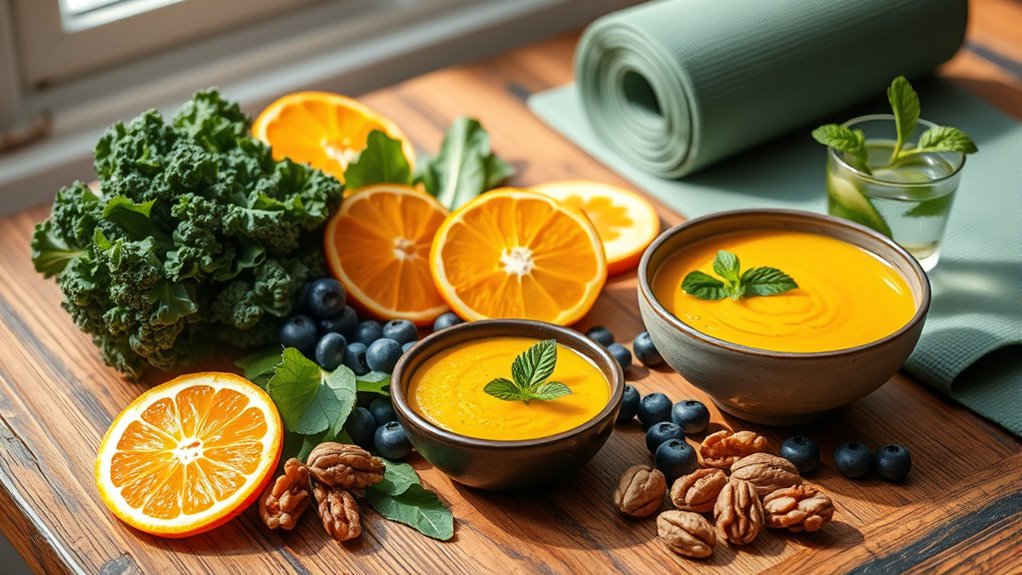
Adopting an anti-inflammatory diet is a powerful step toward better health, but your lifestyle choices can substantially enhance its effects. Regular physical activity, like walking or yoga, helps reduce inflammation and boosts your overall well-being. Prioritizing quality sleep allows your body to recover and lowers inflammatory markers. Managing stress through mindfulness or meditation can prevent chronic inflammation caused by stress hormones. Staying well-hydrated supports digestion and detoxification, further reducing inflammation. Incorporating these habits creates a supportive environment for your anti-inflammatory diet to work more effectively, helping you feel energized and healthier. Additionally, being aware of cultural influences on health behaviors can help you tailor your wellness routine to your environment. Remember, small consistent changes can lead to significant improvements in your inflammation levels and overall health.
Frequently Asked Questions
Can an Anti-Inflammatory Diet Help With Chronic Disease Management?
You might wonder if an anti-inflammatory diet can aid in managing chronic diseases. It often can, because it focuses on foods that reduce inflammation, which is linked to many chronic conditions like arthritis, heart disease, and diabetes. By choosing nutrient-rich, whole foods such as fruits, vegetables, nuts, and fatty fish, you can help lower inflammation levels, potentially easing symptoms and improving your overall health.
Are Supplements Necessary to Achieve Anti-Inflammatory Benefits?
Ever wonder if supplements are essential for fighting inflammation? The truth is, you might not need them. Focusing on a balanced diet rich in fruits, vegetables, whole grains, and healthy fats can provide most anti-inflammatory benefits. Supplements can help fill gaps, but they aren’t a substitute for real food. Keep your diet diverse and nutrient-rich, and you’ll likely get the results you seek without relying solely on supplements.
How Long Does It Take to See Results From Dietary Changes?
You wonder how long it takes to see results from dietary changes. Typically, you might notice improvements within a few days to a few weeks, especially if you’re reducing inflammation-related symptoms like pain or swelling. Keep in mind, individual responses vary based on your overall health, consistency, and the extent of inflammation. Staying committed and patient helps your body adapt and shows positive changes over time.
Is an Anti-Inflammatory Diet Suitable for Vegetarians or Vegans?
Like a wise owl observing the night, you might wonder if an anti-inflammatory diet suits vegetarians or vegans. The good news is, it absolutely can. You’ll focus on berries, leafy greens, nuts, seeds, and plant-based oils—much like a garden in full bloom. With mindful choices, you support your health without compromising your vegetarian or vegan lifestyle, and you may start noticing benefits within a few weeks.
Can I Eat Out While Following an Anti-Inflammatory Eating Plan?
You can definitely eat out while following an anti-inflammatory plan. Just choose restaurants with healthy options, like salads, grilled veggies, and lean proteins. Ask for dishes prepared with minimal processed ingredients, olive oil, and fresh herbs. Avoid fried foods, sugary drinks, and processed meats. Being mindful of ingredients helps you stay on track without sacrificing the social aspects of dining out. Planning ahead makes it easier to make healthy choices.
Conclusion
By choosing anti-inflammatory foods, you’re planting seeds of healing in your daily routine, allowing your body’s natural defenses to flourish. Think of your diet as a gentle river, flowing steadily, washing away the debris of inflammation and nourishing your well-being. With mindful choices and lifestyle harmony, you’re crafting a symphony of health—each note resonating with vitality and resilience. Embrace this journey, and watch your body bloom like a vibrant garden, radiant and strong.
